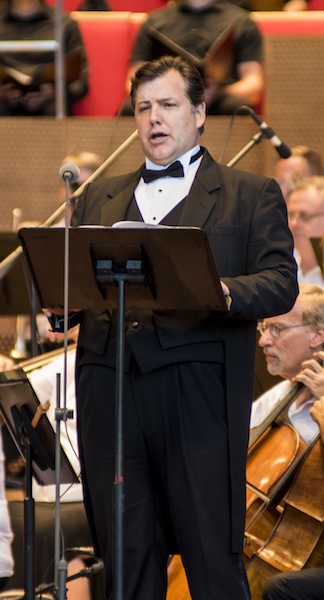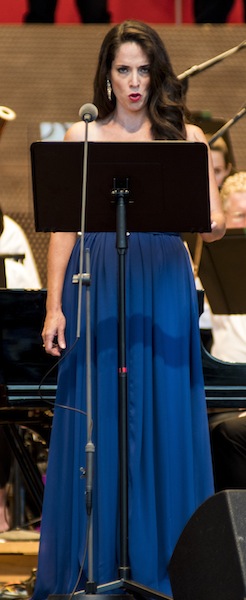Superb soloists and chorus highlight Martin rarity at Grant Park Music Festival

One of the great pleasures of the Grant Park Music Festival is the opportunity to encounter ambitious choral works that one is unlikely to ever hear anywhere else. Festival artistic director and principal conductor Carlos Kalmar and chorus director Christopher Bell have brought several fascinating rarities to Chicago in recent seasons, including Sibelius’s Kullervo, Shostakovich’s Song of the Forests, and Bohuslav Martinů’s The Epic of Gilgamesh.
Friday night at the Pritzker Pavilion provided the festival premiere of another 20th-century obscurity, with Frank Martin’s In terra pax.
The Swiss composer (1890-1974) was highly self-critical and Martin’s output of works is relatively small. Yet his music is of a consistent high quality–well crafted, refined and often austere, reflecting his deep Christian faith. Among his finest works are the Concerto for Seven Wind Instruments, the cantata Le vin herbe–imaginatively staged by Chicago Opera Theater last fall–and, likely his masterwork, the Mass for Unaccompanied Double Choir.
In terra pax was commissioned by Swiss Radio in 1944 to commemorate the hoped-for peace after the end of World War II. As Kalmar noted in his informed introduction, the outcome of the war was not a given at the time of the commission and when Martin began writing it. In terra pax was premiered in May of 1945, three days before the official German surrender.
Martin’s oratorio is written on a grand scale, scored for five vocal soloists, large double chorus and a sizable orchestra including two pianos and celesta. The texts are drawn from a wide array of Biblical sources–oddly not cited in the program. In terra pax begins with a depiction of the violence and carnage of war with the Four Horseman of the Apocalypse, segueing into sections of lamentation and repentance. As the work unfolds, the devout composer places the plea for public peace into a specific context of individual Christian salvation. In terra pax concludes in a larger public expression of peace, with the Lord’s Prayer before ending on an elevated expression of glowing spiritual solace.
Martin wields his vast resources with considerable freedom and variety, often pairing individual soloists with chorus and bringing all five soloists together for the closing sections of each half.
Even so, I’m not sure In terra pax qualifies as a lost masterpiece. There are inspired solo passages and choral writing–especially the final section–yet the music isn’t consistently memorable and settings often alternate so quickly that the larger architecture never quite settles. Still, under Kalmar’s direction, the Grant Park forces delivered a performance of tremendous power and conviction with superb vocalism by the Grant Park Chorus and the soloists.
Baritone James Westman was terrific, getting the evening off in dramatic fashion with commanding solo singing in the warlike “Four Horseman” section. Lauren Segal could have brought more expressive nuance to her extended solo (“Behold my servant whom I uphold”) but displayed a dark, sable mezzo of almost contralto-like depth.
David Pomeroy appeared to have trouble controlling his voice in the early going with a raw undertone and wide vibrato, but the tenor’s singing gained in polish and security as the evening proceeded. Colleen Daly brought a pure and resplendent soprano to her solo opportunities, and Daniel Okulitch anchored the low end with a rich, imposing bass and stentorian vocalism.
Under Bell’s direction, the Grant Park Chorus delivered excellent French diction and sumptuous corporate power in the big moments. At times the amplification balance favored the voices at the expense of the Grant Park Orchestra, but the musicians did their part with playing of Gallic elegance as well as sonic muscle when required.
Mozart’s Symphony No. 36 “Linz” set the scene nicely for the Martin oratorio. Kalmar directed a stylish, vigorous performance, with wonderfully fleet and vivacious string playing in the final movement. The musicians showed admirable professionalism in the Andante, continuing to perform with focus and refinement even with a noisy low-flying helicopter hovering over Millennium Park.
The program will be repeated 7:30 p.m. Saturday at the Pritzker Pavilion. gpmf.org
Posted in Performances






